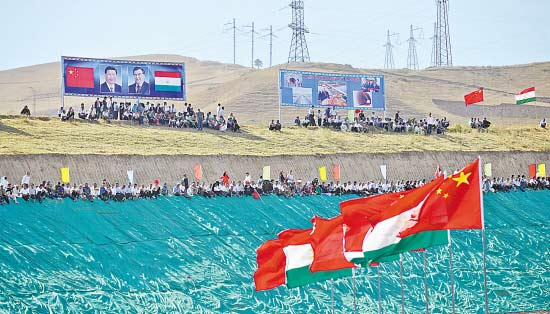

 |
| (China National Petroleum Corporation starts construction of a China-Central Asia gas pipeline in 2014. Photo/Courtesy of China National Petroleum Corporation) |
A Chinese expert on Central Asia said China’s neighbors bordering northwestern China’s Xinjiang pose no imminent threat to the Belt and Road Initiative, hitting back at Western comments that play down China’s ambitious plan.
Speaking at a seminar in Beijing on July 1, Zhu Yongbiao, an associate professor at the Institute for Central Asia Studies at Lanzhou University, said Central Asia’s terrorism situation hasn’t worsened, even though the number of terrorist attacks saw a slight increase.
In 2016, when several major world powers were shaken by multiple attacks, Central Asia only reported a total of four terrorist attacks in Kazakhstan and Kyrgyzstan. From 1992 to 2016, there were some 250 attacks, dozens of which occurred between 1994 and 1997 when Tajikistan was fighting a civil war, Zhu’s data showed.
Central Asian countries were given a relatively low ranking on the 2016 Global Terrorism Index, issued by the Institute for Economics and Peace of Australia, which shows that their security situation is controllable. Specifically, China ranked 23rd on the index and Afghanistan, 2nd. Kazakhstan, Tajikistan, and Kyrgyzstan sat at 94th, 56th, and 84th, respectively, while Uzbekistan and Turkmenistan ranked at the bottom of list, 114th and 130th, respectively.
“Compared with neighboring regions, the risk of terrorism is low,” Zhu said. “The threat actually comes from peripheral areas, such as Afghanistan. In general, the security situation is not worsening, as some Western scholars argue.”
But the threat of attacks in the region is real, and Chinese companies or personnel could become targets.
“The Belt and Road Initiative can actually help speed up economic growth in Central Asia with expanded investment in the region,” Zhu said.
 Fire brigade in Shanghai holds group wedding
Fire brigade in Shanghai holds group wedding Tourists enjoy ice sculptures in Datan Town, north China
Tourists enjoy ice sculptures in Datan Town, north China Sunset scenery of Dayan Pagoda in Xi'an
Sunset scenery of Dayan Pagoda in Xi'an Tourists have fun at scenic spot in Nanlong Town, NW China
Tourists have fun at scenic spot in Nanlong Town, NW China Harbin attracts tourists by making best use of ice in winter
Harbin attracts tourists by making best use of ice in winter In pics: FIS Alpine Ski Women's World Cup Slalom
In pics: FIS Alpine Ski Women's World Cup Slalom Black-necked cranes rest at reservoir in Lhunzhub County, Lhasa
Black-necked cranes rest at reservoir in Lhunzhub County, Lhasa China's FAST telescope will be available to foreign scientists in April
China's FAST telescope will be available to foreign scientists in April "She power" plays indispensable role in poverty alleviation
"She power" plays indispensable role in poverty alleviation Top 10 world news events of People's Daily in 2020
Top 10 world news events of People's Daily in 2020 Top 10 China news events of People's Daily in 2020
Top 10 China news events of People's Daily in 2020 Top 10 media buzzwords of 2020
Top 10 media buzzwords of 2020 Year-ender:10 major tourism stories of 2020
Year-ender:10 major tourism stories of 2020 No interference in Venezuelan issues
No interference in Venezuelan issues
 Biz prepares for trade spat
Biz prepares for trade spat
 Broadcasting Continent
Broadcasting Continent Australia wins Chinese CEOs as US loses
Australia wins Chinese CEOs as US loses